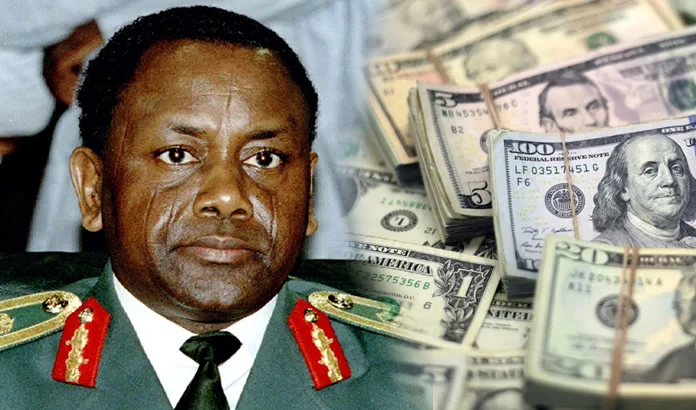FG should account for Abacha loot
Editorial of The Punch Newspaper
THE recent return of $23 million to Nigeria by the United States government, part of funds looted by the late dictator, Sani Abacha, and his cronies, has once more brought to the fore issues of accountability and fiscal discipline in the country’s public administration. From the United States and several other countries, total recoveries so far from the thieving maximum ruler, his family and associates have been put at $3.65 billion. The public deserves a detailed account of how the money was spent.
According to the US Ambassador to Nigeria, Mary Leonard, her country has so far handed over to Nigeria over $334.7 million of the Abacha loot to Nigeria. During the signing of an agreement with the Federal Government for the repatriation of a fresh $23 million, she explained that the US Department of Justice and the Federal Bureau of Investigation seized the stolen funds because Abacha and his associates violated US laws when they laundered the funds through the country to the United Kingdom.
Similarly, in an infographic by the BBC with data gathered from the Federal Government, the World Bank, and Transparency International put the total amount of looted funds recovered from Abacha in the past 24 years at over $3.65 billion.
While in 1998, a total of $750 million was recovered from the late Head of State’s family, in year 2000, $64 million was recovered from Switzerland. In 2002, another $1.2 billion was recovered from the family; in 2003, $160 million and $88 million were recovered from Jersey and Switzerland respectively, and, in 2005, another $461.3 million was returned from Switzerland.
In 2006, Nigeria received another $44.1 million from Switzerland; in 2014, $227 million was recovered from Liechtenstein; in 2018 another $322 million from Switzerland; while in 2020, a total of $311.7 million was repatriated from the US.
The Attorney-General of the Federation and Minister of Justice, Abubakar Malami, stated that the President, Major General Muhammadu Buhari (retd.), approved the use of the S311 million tranche jointly released by the US, UK, and the Bailiwick of Jersey for the ongoing Presidential Development Infrastructural Fund projects. These include the Abuja-Kano Expressway, Lagos-Ibadan Expressway, and the Second Niger Bridge, which are being supervised by the Nigerian Sovereign Investment Authority.
However, many stakeholders are not pleased with the management of the recovered funds. The main grouse is lack of transparency by the government; they argue that the process is not transparent enough and is open to corruption. Even where the recovered funds are earmarked for specific projects, the citizens complain that the impact of such money on the projects is hardly felt.
This is antithetical to democracy, where public accountability is essential for popular buy-in. The US Executive Branch said accountability strengthens democracy and promotes efficiency and effectiveness in government. It added, “Accountability and provides information for citizens about what their government is doing.” Accountability is sorely lacking in Nigeria’s wobbly democracy. Officials spend public funds recklessly and the federal and state parliaments have largely failed in their oversight duties. Typically, the handling of the Abacha loot recoveries has been scandalous.
Recently, the Socio-Economic Rights and Accountability Project asked the President to direct Malami to provide it with a copy of the agreement the government signed with the US for the repatriation of the $23 million tranche. In a letter dated August 27, 2022 and signed by SERAP’s Deputy Director, Kolawole Oluwadare, the organisation said, “By the combined reading of the Nigerian Constitution 1999, the Freedom of Information Act, and the country’s international obligations, there are transparency obligations imposed on your government to widely publish the agreement on the $23 million Abacha loot.” The request has so far been ignored.
According to SERAP, a substantial part of the returned Abacha loot since 1999 may have been diverted, re-stolen or mismanaged. There has been no rendering of account for part or the whole amount. A report in the respected The Economist of London about corruption in Nigeria was emphatic that dollops of recovered stolen assets were routinely “re-looted.” The National Assembly remains curiously tame instead of leading the charge for a full accounting.
Apparently not satisfied with the management of recovered loot in the past, the US said it was keenly aware of the devastating impact of corruption on societies, including eroding trust and the ability of governments to deliver to their citizens. It noted that the mismanagement of recovered loot “distorts the economies and access to key services. It hinders development, pushes citizens towards extremism and makes countries and their officials susceptible to malicious foreign interference.”
Lending credence to this, the African Network for Economic and Environment Justice said $322.5 million recovered from the Abachas between 2018 and 2022 had been shared to 1.9 million poor and vulnerable Nigerians but the disbursement was stopped in 2021 and four states – Kebbi, Ondo, Edo, and Enugu – were left out since 2019 due to technical reasons. The disbursement lacks transparency, equity, and sincerity.
The role of key government officials and prominent Nigerians in facilitating the looting in the first place and negotiating the return call to question their loyalty to the country and the citizens. For instance, the Buhari regime signed two agreements with some members of the Bagudu family to transfer $110 million to it for his role in the recovery of the loot.
Ordinarily, all money accruing to the government ought to be paid into Federation Account and properly appropriated by the National Assembly before it can be spent. Spending without appropriation encourages corruption. However, NASS has been ineffective with regards to the spending of the Abacha loot. The legislature must wake up to its responsibility and hold the executive accountable on how much has been recovered and how the funds are spent.
Civil society organisations should also continue to demand accountability of the funds as democracy without accountability is hollow.

